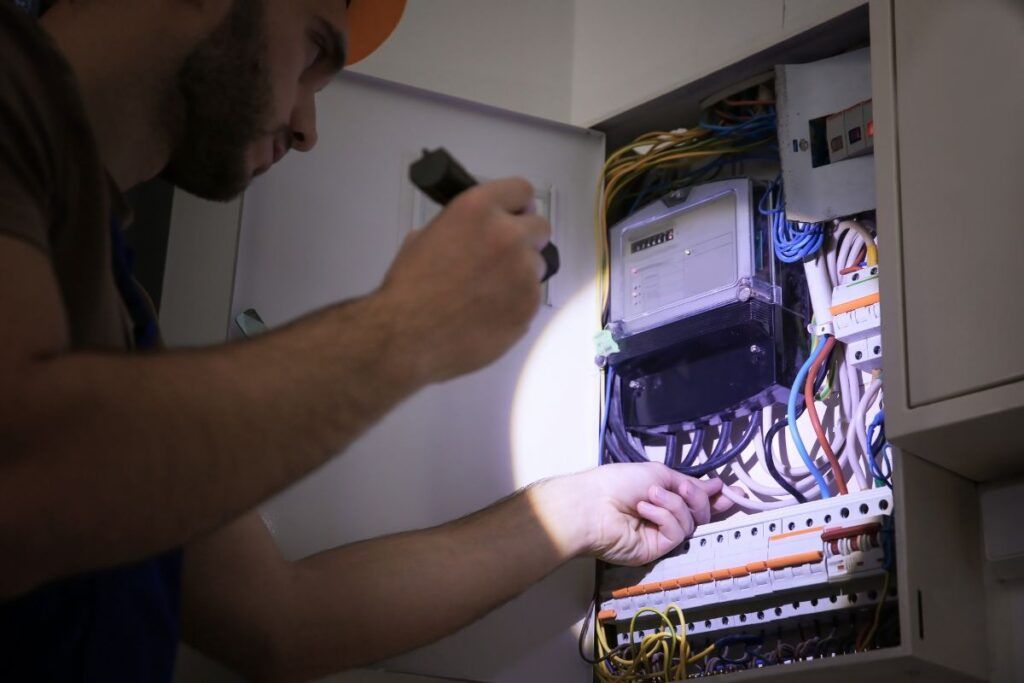Circuit breakers are used to save you from electrical accidents because they will trip off whenever they detect any upcoming electrical issues. In that case, you have to reset the breaker. But is it safe to touch the breaker? Won’t it electrocute you? Let’s find out.
Generally, the likelihood of getting a shock from the circuit when the breaker is off is very low. However, in old houses, there is a chance that even if the breaker is off, the electrical box may have a few live wires that a handyperson might have brought from another breaker to fix an issue.
This article will help you know whether an ‘off’ breaker can shock you or not, and if yes, then what are the reasons behind it. We will also share some tips to avoid electrical shocks while the breaker is in the ‘off’ position.

Check out our list of top-handpicked products for all your electrical, appliance, and HVAC system needs to keep your home running smoothly.
This post includes some affiliate links.Will you get a shock if the breaker is in the ‘off’ position?
Many people consider fixing their houses’ electrical issues on their own.
Hiring a professional to fix every small electricity issue is quite costly.
So, the house owners always try fixing the problems independently and save this cost.
I have done the same thing for years.
Within these years, I encountered multiple electrical problems, solved them, and gained a lot of experience.
In this matter, the answer is yes and no.
You will not receive any electric shocks if you turn off the breaker properly and there are no faults in the wiring and the breaker.
In most cases, the breaker itself would not shock you if turned off properly.
If not, it will shock you.
There are some circumstances where you will receive electric shocks from a switched-off breaker, for example:
- The breaker has loose wire connections.
- The breaker received a short circuit or ground faults.
- It is getting current from your neighbor’s house.
- The breaker is incorrectly labeled.
So, there is no fixed or exact answer to the question.
Depending on the situation, the breaker may or may not shock you.
Let’s explore the circumstances where the breaker may shock you despite being in the ‘off’ position.
Also read: Circuit Breaker Off But Still Have Power: 6 Causes+Fix
Why do I still get shocked when I turn off the main breaker?

Though there are very few reasons behind the main breaker shocking you despite being off, the main reason is the breaker is not labeled.
When a circuit breaker does not work properly, you will not receive results as expected.
So, if the breaker is not working properly, you will get a shock from the direct current despite turning it off.
Let’s talk about all the reasons in detail.
Incorrectly labeled breaker
It would be best not to trust the breakers with no proper labels.
Those could be defective, for which you might receive a serious electric shock despite turning it off.
However, if you want to buy these incorrectly labeled circuits or those with no labels, consider checking them with a voltage testing tool to know their quality.
Use a voltmeter. It will help you know the exact voltage than the non-contact ones because the latter rarely shows any right measurements.
Loose wire connections
Sometimes, the breaker may shock even if you have turned off the main breaker.
It is due to the loose wire connections.
If any wire in the main breaker has loose wires for which the current is leaking, the other breakers will shock you due to the direct current.
Before working with the breakers, check all the wires and terminal voltages.
Also, check the screws.
If any voltage is still left, but you are unaware of the source, you must call an electrician to deal with it.
You can also turn down the main power supply of your house to be on the safe side.
No matter how experienced you are, licensed professionals must handle some issues.
They will fix the issue more safely and quickly than we.
Short circuit
If there has been any short circuit in the main breaker, turning it off will still shock you if you work with the other breakers.
A short circuit occurs when a hot wire connects the neutral or ground wire.
When the hot and neutral connect, there exists an excessive flow of current.
As a result, the breaker cannot handle so much current, causing overheating and a short circuit.
Turning off the main breaker won’t be enough in such a condition. You will have to hire an electrician.
A ground wire doesn’t carry current.
If you connect it with the hot or neutral, it starts carrying current.
So, while turning off the main breaker, you may get shocked if you touch the ground wire.
Also read:
Neighbor’s house
Suppose you live in an apartment or condominium.
In that case, your main breaker will remain slightly energized even if you turn it off.
The current comes from your neighbor’s house.
Due to staying in the same apartment or condo, both of your lines have been connected.
You need to hire a professional to disconnect this line and check the voltage.
Defective breaker
You have turned off the main breaker while working with other house breakers.
But, there is still a current in the breaker.
The reason could be a faulty breaker.
The main breaker may have manufacturing faults, which still carry current.
In that case, only a professional can help you out.
You will have to replace the breaker if it is a manufacturing defect.
Sometimes, the breakers get old due to constant wear and tear.
They fail to work well as they used to when they were new.
So, you will also need to replace it.
How can I avoid electric shocks in the main breaker?

If you are completely naive about electrical projects, you better hire a professional to correct the problems.
If you do anything wrong, it may lead to serious accidents and cost you higher prices.
Even with experience, you must follow proper steps and precautions to work with electricity.
Your first job will be to look at and inspect everything related to the problem to ensure there are any chances of encountering any live wires.
You have to check that the area where you are working is dry and no wet areas are present in the surrounding.
Otherwise, you may receive a bad electric shock while working.
You must wear goggles and gloves, and by gloves, I do not mean any regular rubber gloves.
It has to be thick nitriles, for example:
- Heavy duty gloves, Infi-Touch, Strong and Tough
- SAS Safety 66519 Raven Powder-free Nitrile Disposable Gloves
Next, you must check the breaker after turning it off with a voltage tester or multimeter to check for any signs of voltage.
The best tester is a non-contact voltage tester.
With this device, you do not have to touch any wires or terminals.
The tester beeps or lights up whenever it detects the presence of alternating current or AC voltage by sensing electromagnetic fields in the wires or breakers.
You should check the wires, the terminals, and even the screws.
If you cannot detect where the voltage is coming from, you need the electrician’s help.
You can also turn off the main power line of your house with the breaker.
It will also avoid electric shocks when you try working with the breakers.
Suppose the problem is with the wires or something serious, like loose wires, shared neutral, or current coming from the neighbors’ house.
In that case, you need a professional to do the job.
Uses of DMM

Using a voltage tester before starting to work with a circuit breaker is the only way to avoid electric shocks.
The best tester is the DMM or direct multimeter.
You can use it for various purposes, and below are a few of them:
- To test the direct current or DC of batteries in the devices, you can use a Digital multimeter or DMM. It will help you detect the amount of power left.
- To test the alternating current or AC of the ground or neutral wires, you can use a DMM.
- In older homes, detect the current with DMM for hot and ground wires. In old houses, both wires are black.
- DMM helps you determine the amount of current flowing through the wires.
- Devices like washing machines and dishwashers contain a solenoid valve. Constant closing and opening of this valve will create unnoticeable breaks in the solenoid coil and stop the valve from working. A DMM can help you confirm it.
Is it okay to turn off the main breaker?
Turning off the main breaker while working with other breakers is fine.
Turning off the main breaker will keep other breakers off even if they have some faults or share neutrals from other circuits.
But, you will be damaging the breaker if you constantly trip it.
For example, some people turn off the breaker when they vacation and turn it on again when they return.
They do this to save electricity.
But, this constant turn on and off creates an electrical surge, reduces the breaker’s lifespan, and damages the breaker.
It is fine if you keep the breaker off for some years.
Otherwise, you can keep it on.
Instead, you can unplug the appliances or use energy-efficient appliances to save electricity bills.
Do I need to turn off the main breaker?
It is not compulsory to turn off the main breaker.
If you need to work with any outlet, you need to turn off the breaker that is powering the circuit.
But, if the breakers still have power, you must go for the main breaker.
However, a few common reasons behind the breaker not responding well are explained below:
- The wires might have become loose due to some previous works for which the breaker will shock you if you do not turn off the main breaker.
- The neutral wire of the switched-off circuit might be receiving current from another breaker that is still energized. That is why the switched-off circuit still has power.
- The switched-off circuit might be connected with another energized circuit, for which the circuit breaker still holds current after turning off. It is called a double-feed circuit.
- The breaker might be defective.
You need to hire a professional if your breaker gives electric shocks even after turning it off.
You can also turn off the main circuit breaker to find the real cause behind such circuits.
Once you identify and fix the problem, you can turn on the main breaker and then the other breakers.
Also read: How Long Can You Leave A Circuit Breaker Off? (+Energy Saving Tips)
Final thoughts
You may or may not receive electric shocks even after turning off the main breaker. If the main breaker is defective or the wires have loose connections, you will receive shocks from the breakers despite turning off the main breaker.
You can avoid electric shocks by testing the main circuit breaker before touching or working with it. You can also turn off the main power line to your house and work. Check for any loose wire connections before turning them on.
It is not necessary to turn off the main breaker. If you want to work with the outlets or switches, you can turn off only the breaker powering these outlets. But, it is always safe to turn off the main breaker.
Data Source: National Electrical Code, NEC Wire Table, Electrical wiring, Home wiring.
